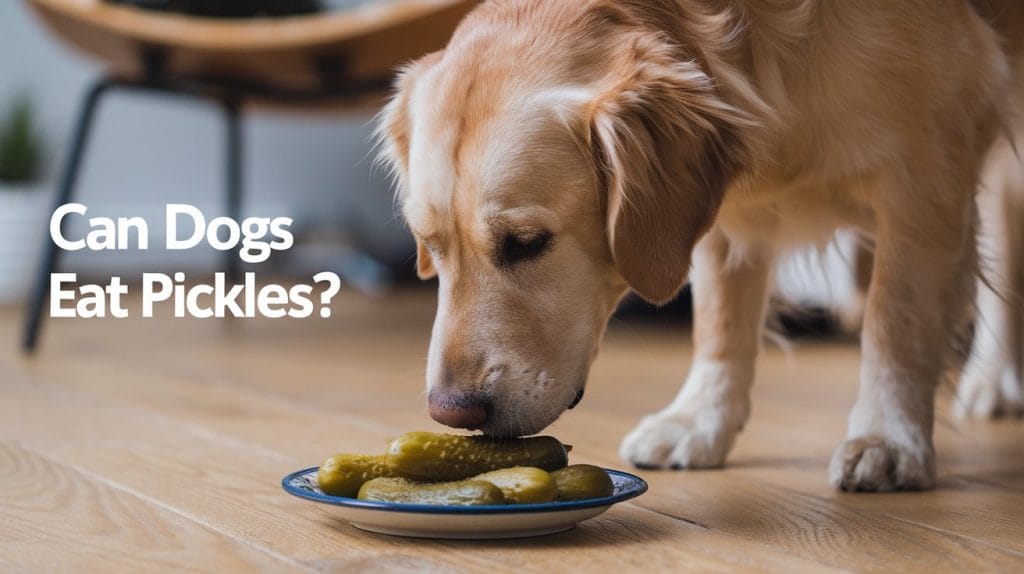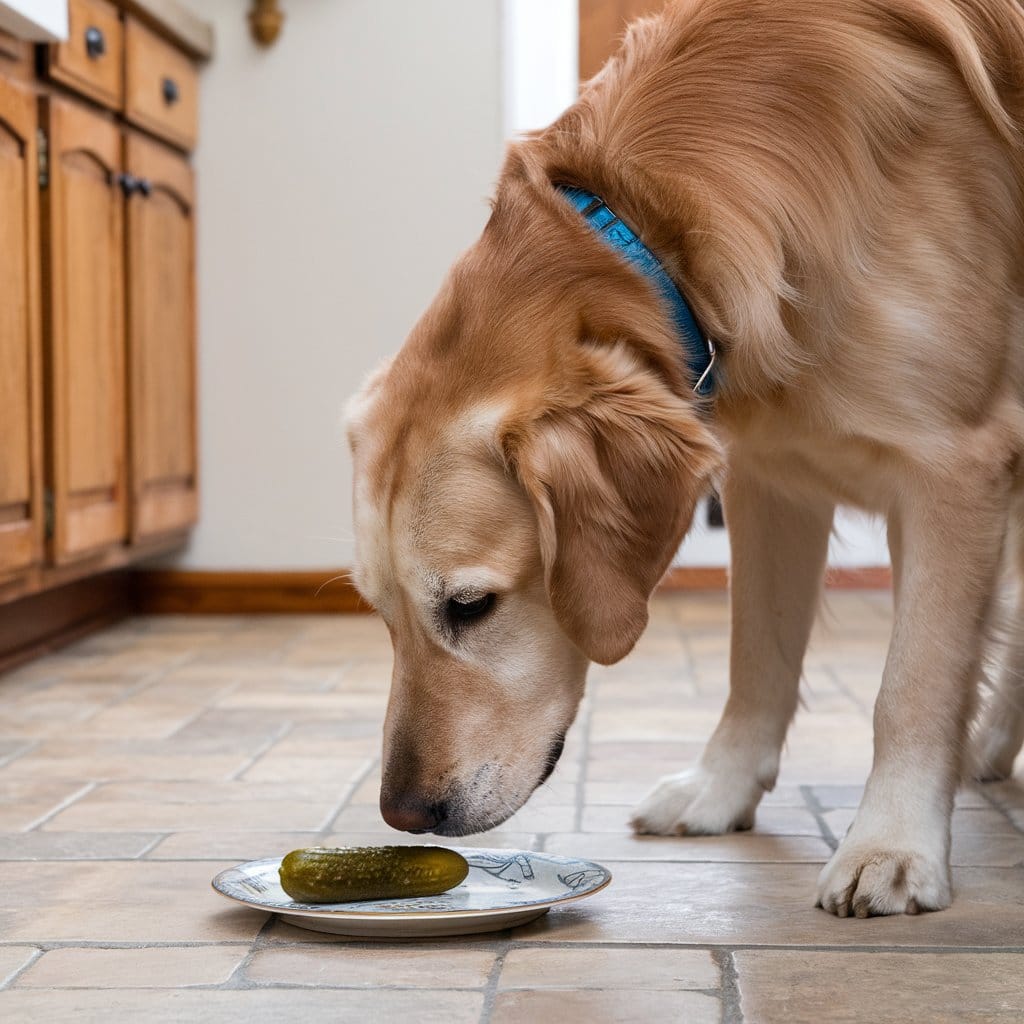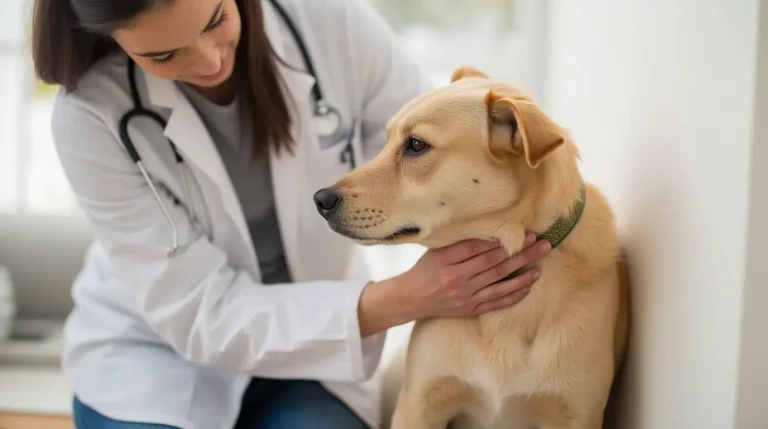This article explores the nutritional needs of dogs and analyzes the components of pickles to answer the question, Are Pickles Safe for Dogs? It examines the impact of pickle ingredients on canine health and discusses the importance of moderation when offering this treat. By considering these factors, readers will gain insights to make informed decisions about including pickles in their dog’s diet.
Table of Contents
The Nutritional Needs of Dogs
Dogs require a balanced diet to maintain optimal health and well-being. The Association of American Feed Control Officials (AAFCO) has identified six essential nutrients that support life and function in dogs: water, carbohydrates, vitamins, minerals, fat, and protein. These nutrients play crucial roles in various bodily functions and must be provided in appropriate amounts.
Protein is vital for muscle development, skin health, and blood formation. The AAFCO recommends a minimum of 18% dry matter (DM) for adult dogs and 22% DM for growing dogs. Fats, which provide concentrated energy and aid in vitamin absorption, are equally important. Carbohydrates supply energy and dietary fiber, while vitamins and minerals contribute to bone development, blood clotting, and neurologic function.

Water, often overlooked, is essential for all bodily functions. A dog’s specific energy requirements can vary based on factors such as age, activity level, and breed. To ensure a complete and balanced diet, pet owners should look for foods that meet AAFCO standards or consult with a veterinarian for personalized nutrition advice.
Are Pickles Safe for Dogs? Analyzing the Components of Pickles
Pickles are cucumbers preserved in a brine solution, typically consisting of vinegar, water, and salt, along with various spices. While cucumbers themselves offer health benefits, the pickling process introduces elements that require careful consideration for canine consumption.
The high sodium content in pickles poses a significant concern. Excessive salt intake can lead to dehydration, increased thirst, and in severe cases, sodium poisoning in dogs. This condition may cause symptoms ranging from vomiting and diarrhea to more serious neurological issues like seizures or loss of balance. Additionally, some pickles contain ingredients such as garlic and onions, which are toxic to dogs and can cause anemia. Spicy varieties may also upset a dog’s digestive system, potentially resulting in gastrointestinal distress. Despite these risks, pickles do contain some beneficial components, including fiber and vitamins A and K.
Moderation and Precautions When Feeding Pickles to Dogs
While pickles are not toxic to dogs, moderation is crucial. A small piece of pickle occasionally won’t harm most dogs, but regular consumption can lead to health issues. The high sodium content in pickles can cause excessive thirst, urination, and in severe cases, sodium poisoning. This is especially concerning for dogs with underlying health conditions such as high blood pressure or heart disease.
Pet owners should be cautious of pickle ingredients that are harmful to dogs. Some pickles contain additives like garlic, onions, or xylitol, which are toxic to canines. Sweet pickles often have added sugar, another unhealthy ingredient for dogs. Instead of pickles, offering plain cucumbers as a treat provides similar nutritional benefits without the risks.
If a dog consumes a large quantity of pickles or pickle juice, it’s crucial to contact a veterinarian immediately. Symptoms of salt poisoning may take up to 12 hours to appear, so prompt medical attention is essential. Always consult a vet before introducing new foods to a dog’s diet.
Wrap-Up
The decision to feed pickles to dogs requires careful thought. While not toxic, pickles have an impact on canine health due to their high sodium content and potential harmful ingredients. Pet owners should prioritize their dog’s nutritional needs, which include a balance of protein, fats, carbohydrates, vitamins, and minerals. Offering plain cucumbers as a treat provides similar benefits without the risks associated with pickles.
To keep dogs safe and healthy, moderation is key when it comes to human foods. A small piece of pickle occasionally won’t harm most dogs, but regular consumption can lead to health issues. It’s crucial to be aware of the ingredients in pickles and to avoid those containing additives toxic to dogs. In the end, consulting with a veterinarian is the best way to make informed decisions about a dog’s diet and to ensure their overall well-being.
FAQs
1. What should I do if my dog eats a pickle?
Pickles are generally safe for dogs if consumed in moderation. It’s fine to occasionally give your dog a plain pickle. However, avoid pickles that contain garlic, peppers, or onions, as these ingredients can be harmful to dogs.
2. Is it okay to feed my dog dill pickle chips?
While dill pickle chips are not inherently toxic to dogs, it’s best to avoid giving any pickled vegetables to your dog. This includes pickle spears, pickled carrots, and dill pickle chips, regardless of how much your dog may want them.
3. Can I give my dog pickle relish?
It is advisable not to give pickle relish to dogs. Pickle relish typically contains a mix of finely chopped pickles and other ingredients such as peppers, onions, and spices, which may be harmful. It also often contains a high amount of sugar.
4. Is it safe for my dog to have a bite of my pickle?
While a small bite of pickle is not toxic to dogs, it’s generally recommended to avoid feeding your dog pickles as part of their diet. If your dog accidentally eats a pickle, there shouldn’t be an immediate concern, but regularly including pickles in their diet is not advised.






